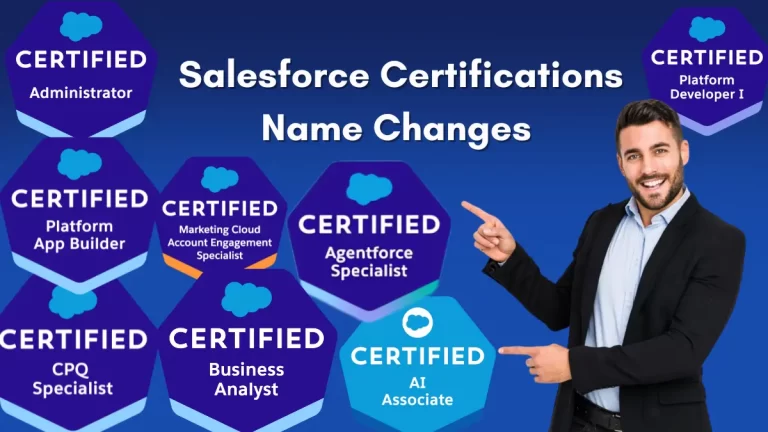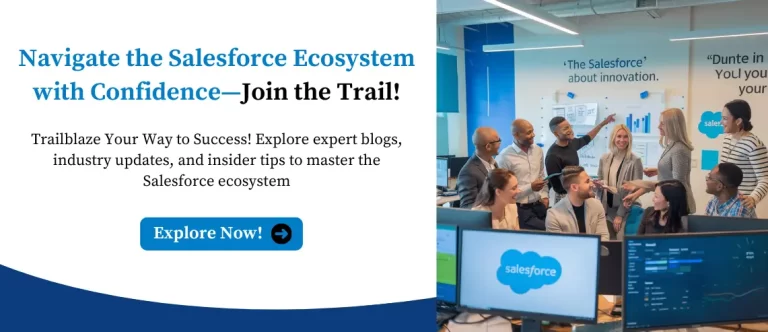Earning a Salesforce certification is a significant milestone for anyone looking to advance their career in the Salesforce ecosystem. Whether you’re an admin, developer, consultant, or architect, preparing for the certification exam can feel overwhelming without the right approach. That’s why we’ve put together this high-quality guide on Salesforce Certification Strategies—to help you tackle the exam with confidence and clarity.
In this article, we’ll cover 10 proven strategies that will make your journey smoother and more successful.
What is a Salesforce Certification Exam?
A Salesforce certification exam is an industry-recognized credential that validates your knowledge within a specific role, grows your resume, and highlights your skills. Each certification—like Administrator, Developer, or Consultant focuses on a specific role or skill set. These exams are multiple-choice, timed, and based on official exam guides that outline key topics and their weightings. Passing an exam demonstrates your expertise and helps you stand out in the Salesforce ecosystem. Certifications also enhance career growth, making you more attractive to employers and boosting your earning potential. In short, it’s your ticket to success in the Salesforce world.
Certification Strategy 1: Start with the Exam Guide
Every successful certification journey begins with understanding the exam’s objectives. Salesforce provides detailed Exam Guides that outline topics and their weightings. For example, the Salesforce Agentforce Specialist Certifications shares the 5 objectives — and their associated weighting — that you’ll need to know in detail to pass your exam and including:
- Prompt Engineering – 30%
- Agentforce Concepts – 30%
- Agentforce and Data Cloud – 20%
- Agentforce and Service Cloud – 10%
- Agentforce and Sales Cloud – 10%
Tip: Create a study plan that breaks down each objective and allocates time based on its importance. This way, you’re not studying everything equally but focusing on what counts most.
Certification Strategy 2: Choose the Right Exam Format
Salesforce offers two options for taking the certification exam: online proctored or onsite at a testing center. Both formats have their pros and cons. Online exams are convenient but require a quiet space and a stable internet connection. Testing centers allow you to have paper and a pencil, while online exams don’t.
Understanding your learning style and test-taking preferences is an important part of your preparation. Pick the format where you feel most comfortable and focused.
Certification Strategy 3: Master Time Management on Test Day
Each Salesforce certification exam typically gives you 60 questions in 105–120 minutes, which means you have only 2 minutes per question. Pace yourself. If you’re unsure about a question, don’t get stuck—mark it for review and move on. This ensures you answer all questions and come back to the tougher ones later.
Bonus Tip: Remember that Salesforce doesn’t penalize for incorrect answers. If you’re unsure, take your best guess and keep going.
Certification Strategy 4: Leverage Memory Aids and Mnemonics
Salesforce exams often include complex concepts, processes, and sequences that can be hard to remember under pressure. One of the most powerful Salesforce Certification Strategies is using memory aids like mnemonics or acronyms.
For example, to remember the order of execution in Salesforce, you might use the phrase: “Very Awesome Admins Work Pretty Efficiently, Right?” Each word represents a step in the process. Creating these memory hooks during your study sessions will help you recall them on exam day.
Certification Strategy 5: Trust Your Instincts (and Don’t Leave Anything Blank)
If you don’t know the answer, make an educated guess. Salesforce exams don’t penalize wrong answers, so it’s always better to attempt every question. Often, your first instinct is correct. When you return to flagged questions, reread the full question and all answer choices carefully to avoid any confusion.

Certification Strategy 6: Focus on Understanding, Not Just Memorization
Don’t just memorize questions and answers from practice exams—Salesforce frequently updates its exam bank, and questions are randomized. Focus on understanding the concepts behind each question, so you can apply them to any scenario that comes your way.
Tip: Use hands-on practice in a Developer Edition org. Experiment with features like workflow rules, validation rules, and process automation. This builds real-world experience and deepens your knowledge.
Certification Strategy 7: Embrace Hands-On Practice
Reading about Salesforce concepts is one thing, but applying them in a real org is another. Hands-on experience helps you solidify your understanding and prepares you for scenario-based questions often found in exams.
Tip: Spin up a free Salesforce Developer Edition org. Practice creating workflows, managing users, building reports, and experimenting with different features. This hands-on approach not only reinforces learning but also boosts your confidence.
Certification Strategy 8: Engage with the Trailblazer Community
One of the most powerful Salesforce Certification Strategies is learning from others. The Trailblazer Community is filled with professionals who have walked the same path and are happy to share insights, study tips, and even practice questions. Join study groups, ask questions, and share what you learn. Teaching others is one of the best ways to deepen your understanding.
Certification Strategy 9: Leverage Official Study Materials and Trailhead
Salesforce’s Trailhead is an essential resource for certification preparation. It offers tailored modules, projects, and Trailmixes aligned with exam objectives, helping you learn both theory and practical skills. Using official study materials ensures you focus on relevant content created by Salesforce experts. This combination of guided learning and real-world application strengthens your knowledge and boosts exam readiness effectively.
Certification Strategy 10: The Power of a Study Plan
Creating a well-structured study plan is one of the most powerful Salesforce certification strategies. It helps you stay organized, focused, and consistent throughout your preparation. A clear plan also lets you track progress, identify weak areas, and build confidence, making your certification journey smoother and more successful.
Final Thoughts for Salesforce Certification Strategy
Achieving a Salesforce certification is a milestone that demonstrates your expertise and commitment to professional growth. By following these Salesforce Certification Strategies, you’ll set yourself up for success, turning a potentially daunting challenge into an opportunity for growth and learning.
Remember, it’s not just about passing an exam—it’s about building the skills and confidence to thrive in the Salesforce ecosystem. Good luck on your journey!
Must-Visit Links:
- Salesforce Certifications Name Changes 2025: A Complete Guide for Salesforce Professionals
- Dreamforce 2025 Registration is Open Now: Everything You Need to Know
- How to Crack the Salesforce Interview: Real Questions and Tips from Experts
- Top Most In-Demand Salesforce Skills for 2025: What Professionals Need to Know
- How I Passed the Salesforce Data Architect Exam on My First Attempt
- How to Prepare for the Certified Agentforce Specialist Certification Exam
Resources
- [Salesforce Developer]- (Join Now)
- [Salesforce Success Community] (https://success.salesforce.com/)
For more insights, trends, and news related to Salesforce, stay tuned with Salesforce Trail

Mayank Sahu
I’m a Salesforce enthusiast passionate about CRM solutions, automation, and integrations. As a continuous learner, I stay updated with the latest Salesforce trends, tools, and innovations to share valuable insights and best practices. My goal is to help businesses and professionals maximize their Salesforce potential through actionable tips, industry updates, and strategic guidance.
Follow me for expert insights and the latest updates from the Salesforce ecosystem!
- Mayank Sahu#molongui-disabled-linkDecember 11, 2025
- Mayank Sahu#molongui-disabled-link
- Mayank Sahu#molongui-disabled-linkOctober 24, 2025
- Mayank Sahu#molongui-disabled-linkOctober 15, 2025












